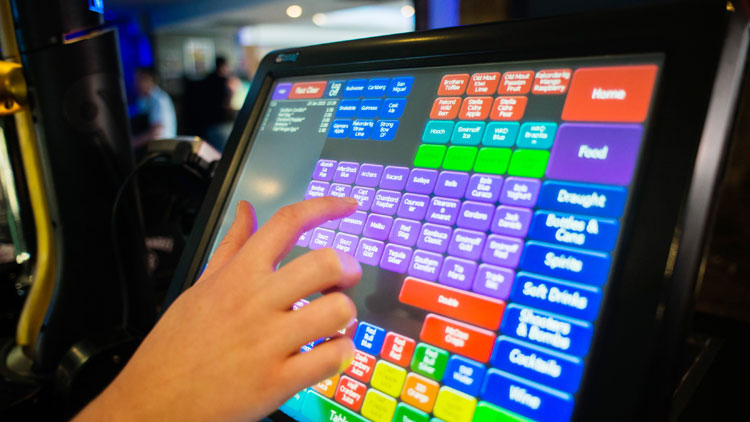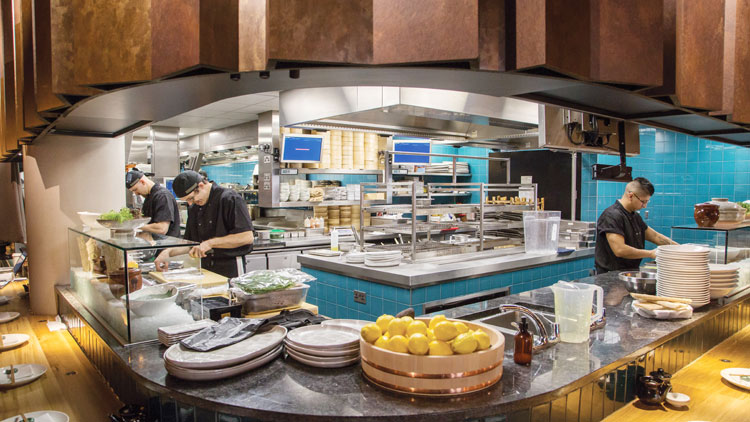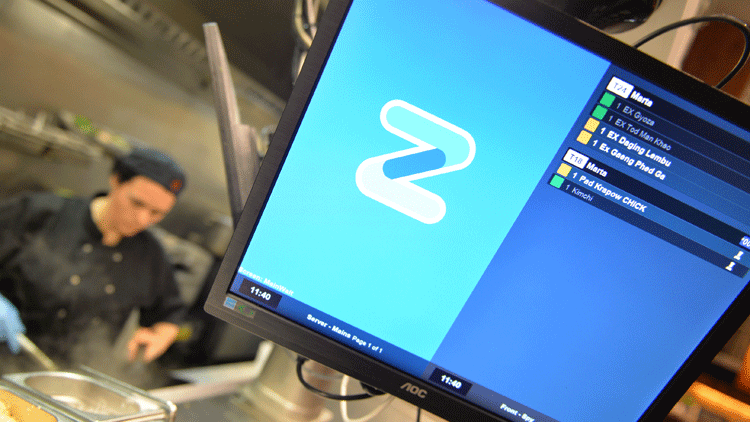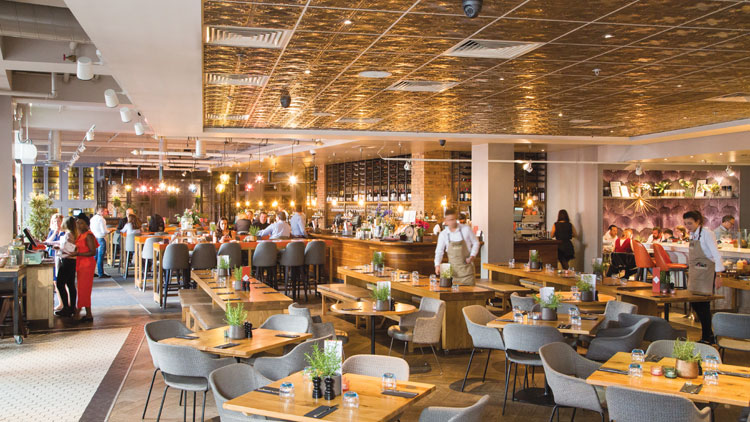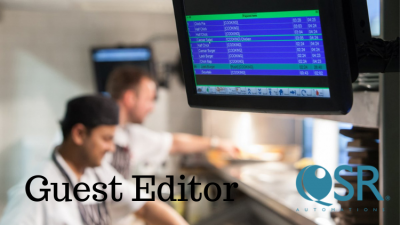Ringing the changes: have your EPoS needs changed as you've grown?

When brothers James and Thom Elliot launched their first Pizza Pilgrims restaurant in Soho in 2013, they did so using an iPad app-based EPoS system which only just did the job.
Being Wi-Fi based it was pretty unreliable, so the duo knew that as they expanded to further sites they would need to upgrade to a more sophisticated technology solution.
“With the Wi-Fi-based iPad system, we had real issues with the Wi-Fi dropping out and losing all orders and bills – a nightmare on a Friday night,” recalls James. “Also, as you grow you need reporting to be second to none so finance and ops team can monitor each pizzeria’s performance closely, as well as offering accurate measureables for our GMs and head chefs to control and be bonused against. It gets harder to have grey areas and the more black and white you can keep it, the happier your teams are.”
So five years ago the now 10-strong chain switched to an EPoS solution provided by Comtrex that gives the pair the kind of analysis they believe is crucial for an expanding business. “It’s a reliable system that lets us access our sales and day-to-day data very easily. We also manage our stock through Comtrex,” explains James.
“We now have good relationships with the team and have learned the best ways to use the system, so we’re not actively looking to change – we’re also terrified by the amount of work to change over.”
And that’s just it: if, from the outset, you can choose an EPoS supplier with the technology in place to grow with your business, you can save yourself a whole lot of time and money.
“It’s extremely important [when choosing an EPoS system] to research the flexibility and adaptability the whole technology suite can offer. A large percentage of our clients initially enquire with us after ‘outgrowing’ their previous EPoS system – it’s become quite a common issue,” says Tevalis sales director James Humble.
Switching EPoS systems can be a costly decision, so getting it right first time is key. “Look for a provider that continues to evolve its product suite in line with the demands of the hospitality industry, and that can adapt software to meet specific business’ requirements, as this reflects forward thinking,” he continues.
Hitting a six
Kricket is another growing group that didn’t choose the right EPoS system first time around, and made the switch when founders Rik Campbell and Will Bowlby realised the limited technology their system offered was actually stifling their expansion.
The now three-strong modern Indian group started out in 2015 in a 20-seater shipping container in Brixton, before opening its first restaurant in Soho in 2017.
“Our original EPoS provider didn’t take us seriously because we were in a shipping container. They didn’t even tell us about the back office. We had to pay for everything up front rather than leasing, and support was non-existent,” recalls Campbell.
After much research and asking around for recommendations, the duo switched to Tevalis, and they’re convinced the move has been central to their success.
“Tevalis has been critical to our growth because of the financial information their technology provides us with and the ability their system gives us to do stock control, especially around recipes and GP margins,” says Campbell.
One of Campbell’s favourite technology solutions from Tevalis is the Centralised Management module which enables Kricket to have a centralised catalogue of all products for all sites. With the ‘packages’ feature, managers have the ability to make estate-wide changes to menus/the PoS from any internet device.
“Before we started using Tevalis, stock control was pretty much done on the back of a fag packet,” says Campbell.
“With Centralised Management we can manage three sites from outside the restaurant: we are adding new products and new recipes and it can all be done away from the restaurant, not directly on the till, so it saves a lot of time.
“Another huge benefit of Centralised Management is getting recipes and suppliers consistent across all sites. This means customers get the same gastronomic experience no matter where they are.”
Kricket also takes full advantage of the Business Analytics module, which enables Campbell to run any number of reports on every aspect of the business.
“As a business owner, I spend a lot of time looking at the financials and Tevalis enables me to go into a lot of detail. With Business Analytics I can pull off hundreds of reports, from detailed sales breakdowns for each site to gross profit margins for each product, individual staff performance, peak times, and historical data for budgeting and forecasts for the following year.”
Net profits
Six-strong seafood chain Rockfish (with two more openings in the pipeline this year) also found out the hard way the importance of choosing an EPoS provider that can support business growth.
Launching in Dartmouth, Devon, in 2010, Rockfish used two different EPoS providers before switching to its current supplier Zonal nearly five years ago.
“The previous companies didn’t offer the level of support and flexibility that we required as we grew,” says operations director Mat Prowse. “EPoS requirements do change as you grow, so choosing a company early on that either has the inbuilt functionality for reporting and stock control, or has the ability and flexibility to integrate seamlessly with other systems, is vital. You need to be able to manipulate data quickly and also make changes across your estate easily without disruption to operations.”
Another crucial consideration for expanding chains looking for the right EPoS provider is to choose a company that offers round-the-clock customer support and comprehensive training, as Zonal sales director Tim Chapman explains.
“Doing your homework and making sure your provider offers a flexible product that can seamlessly adapt and grow with your business is essential, but so is training and support. We all know that the hospitality sector is not a 9-5 operation, so you need to make sure you can access customer support any time, any day of the week. Likewise, training is also an essential part of the mix, yet it’s often only paid lip service by many EPoS providers.”
System support, training and user-friendliness were certainly key drivers for Rockfish when selecting Zonal as its technology supplier. “A big thing for us was customer service and support: Zonal offered that and have proven it by continuing a high level of support, from installation to training for the whole time we have been with them,” continues Prowse.
“Another reason was the simplicity of the whole Zonal solution, as our previous systems were clunky, complicated and unresponsive.
“The front end has to be simple, easy and quick to use, especially in our busy environments. The Zonal Aztec solution has been extremely reliable and doesn’t fall down.”
While intelligent and reliable technology is crucial to any restaurant’s success, it becomes even more vital as a restaurant business grows because of the need to maintain consistency across multiple sites. “The main challenge for operators as they expand their business is operational consistency,” says vice president of sales at QSR Automations Ashley Sheppard. “How do they offer the same high-quality service/food offer in Edinburgh as they do in London? The answer is to underpin their operation with technology that gives their front and back-of-house teams the ability to perform their roles within operational guidelines, while at the same time giving the senior team insight into how each site is performing.”
Sheppard recommends choosing an EPoS system that is cloud-based and offers integration with other industry-leading technologies, including kitchen automation, table management, stock and HR solutions.
For example, QSR’s ConnectSmart Kitchen solution interfaces with more than 60 EPoS systems worldwide and can also be teamed with its DineTime table management solution.
“Competition is the fiercest it’s ever been, with guest expectations higher than ever before, without taking into consideration the ever-increasing consumer demand for delivery. An EPoS platform that offers integration with industry-leading solutions allows operators to choose best-of-breed solutions that are designed to be flexible as their business grows, and adapt to consumer trends in an ever-changing market place,” says Sheppard.
Tom Moore, head of product at iZettle, also advises choosing an EPoS solution that can integrate with third party technologies such as iZettle’s own payments app.
“A key part of what we do is integrating with best-of-breed third party solutions that help our customers through the pain points of growing. Examples include staff management, stock ordering and accounting integrations, while iZettle integrates with existing iPad-based EPoS systems through our payments SDK,” he adds.
Jerome Laredo, vice president at Lightspeed EPoS, stresses that operators with ambitions to grow beyond one site really need to choose their EPoS supplier carefully to avoid “outgrowing your technology”.
“The last thing you want is to be ready for growth but held back because of technical issues and restrictions. It’s important to keep in mind that even though your business might not need certain features now, it might in the future, and you’ll be happy they’re ready to go once you do need them,” says Laredo.
The personal approach
As well as choosing a system that integrates seamlessly with third party apps, he recommends making sure systems offer the ability to personalise certain aspects of point of sale, such as setting promotions and discounts, and giving user roles and specific permissions.
“With Lightspeed Restaurant EPoS, an owner with a growing operation can make mass changes to the menu or pricing in one shot across all locations,” says Laredo. “The possibility to add a loyalty program is the latest addition to the system and is a fantastic and crucial step to building a returning customer base for expanding chains.”
He adds: “Another option within Lightspeed is to use something called Lightspeed Delivery which eliminates the need to manually enter every incoming order from various delivery services into your EPoS, and significantly reduces the number of order errors. You can see all your orders intuitively organised on one screen, which makes it easier to serve your customers, whether they’re eating at your establishment or at home.”
Bringing everything together
Omnico’s Commerce solution portfolio is used by major brands including Pret a Manager, and is especially popular with theme park operators that need a system that can tie together lots of types of retail operation within one large venue. Its cloud-based point of sale (POS) and customer engagement solutions allow different parts of the catering environment to speak to a single transaction and engagement engine. “We also enable our clients to design and deploy complex customer journeys in a transitionary way, that utilises existing environments rather than ripping and replacing current systems. Our software also plugs into a variety of kitchen management and restaurant systems seamlessly,” says a spokesperson.
In common with Pizza Pilgrims, Kricket and Rockfish, Bath Pub Company also started out with an EPoS provider that didn’t offer enough functionality to support its growth.
With ambitions to add further sites, the four-strong company, launched in 2006 by Joe Cussens and Justin Sleath, needed to find an EPoS provider that could facilitate its highly flexible business model and, after much research, Zonal was chosen for the job.
Cussens explains: “Each of our four pubs has its own distinct personality and we encourage our managers to run the pubs as their own. The chefs create their own menu according to what will work best for the pub – it’s about as far away from one-size-fits-all as you can get – so we needed a technology partner that could cope with this challenge.”
Having installed Zonal’s Aztec EPoS terminals and iServe handheld mobile devices, Bath Pub Company has witnessed an improvement in efficiency and productivity, while the data Cussens is able to extract from the system is proving invaluable.
“The level of detailed data we are able to access through Aztec is second to none. We have been able to drill down and identify everything from mistakes being made by staff, that when added up are costing the business, to the success (or not) of promotions,” he says. “The reporting has given our managers a level of accountability and responsibility they didn’t have previously, and they have responded well to the opportunity and insight they now have at their fingertips. Previously, we had to use an external provider to manage our wet stock, and gathering the necessary data from the EPoS was nigh on impossible. Thanks to Aztec, those frustrations are behind us – the process has been transformed and we can control our stock levels at each site far more efficiently.”
Bath Pub Company uses labour management tool S4Labour, which integrates seamlessly with Aztec EPoS, meaning management can see labour cost versus sales on an hourly basis.
Also, Zonal’s attendance module integrates with S4 and means that Bath Pub Company’s employees no longer have to clock in manually.
“Our team members simply clock in at the start of a shift via a Zonal screen, which automatically updates the rota/time sheet on S4,” adds Cussens. “This saves a huge amount of time for our managers and gives them the time to focus on customer service.”
The Insider: Ashley Sheppard, vice-president of sales at QSR
How do EPoS requirements change as restaurant businesses scale? Are there functionalities that become more critical?
The face of the EPoS industry has changed beyond recognition over the past 10 years. It is not the key driver in supporting and improving operations as it has little impact on guest satisfaction. What is important is having an EPoS solution that is resilient and supported, can be hardware agnostic and cloud-based, while offering an open-minded approach to integrations. Operators want best-of-breed solutions, proven within the market by their peers, not a one-stop-shop approach, and the EPoS industry is now adapting to that.
How do QSR’s products benefit expanding restaurant chains? How do they integrate with EPoS systems?
The main challenge for operators as they grow/expand their business is operational consistency. How do they offer the same high quality service/food offer in Edinburgh as they do in London? The answer is to underpin their operation with technology that gives their front and back-of-house teams the ability to perform their roles within operational guidelines, while at the same time giving the senior team insight into how each site is performing.
We are able to support the front-of-house team by utilising our table management solution DineTime to tell them when a table is available based on historical table-turn data, and at the same time taking into consideration the status of every guest currently sat within the restaurant. We have a direct link to our ConnectSmart Kitchen solution, which informs the kitchen what to cook and when to cook it, supported by graphical food specs. This is key to delivering operational consistency and, in turn, delivering on guest expectations, while at the same time giving operators a digital footprint of the whole guest journey.
With over 60 EPoS interfaces worldwide, we are seen as the gold standard for Kitchen Automation in the hospitality industry and the go-to providers for both front and back-of-house technology innovation and trends. The key is to support operators by giving them the ability to choose the best Kitchen Automation, Table Management, Stock and HR solutions for example, built around a flexible and resilient EPoS platform, the tools required if an operator is to grow/expand successfully.
What advice can you give to restaurant operators looking to expand about choosing technology providers and getting the most out of their EPoS system?
Any operator who does not underpin their business with technology is running a significant risk of failing to deliver on their vision and the expectations of their shareholders/investors. Competition is the fiercest it’s ever been, with guest expectations higher than ever before, without taking into consideration the ever-increasing consumer demand for delivery. An EPoS platform that offers integration with industry-leading solutions allows operators to choose best-of-breed solutions designed to be flexible as their business grows and adapt to consumer/guest trends in an ever-changing market place. In addition, choose solutions that can provide you with granular data so you can measure the guest journey, giving you the opportunity to monitor team performance both front and back-of-house.
This is a web version of an article that first appeared in the May issue of Restaurant magazine, the leading title for the UK's restaurant industry. For more features, comment, interviews and in-depth analysis of the restaurant sector subscribe to Restaurant magazine here.
